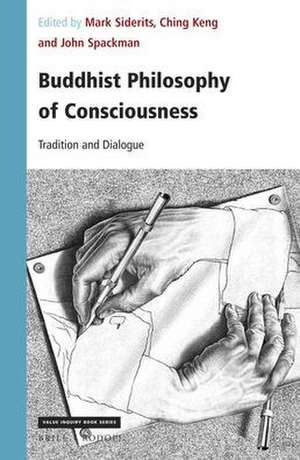Buddhist Philosophy of Consciousness: Tradition and Dialogue: Value Inquiry Book Series / Cognitive Science, cartea 354
Editat de Mark Siderits, Ching Keng, John Spackmanen Limba Engleză Hardback – 18 noi 2020
Preț: 721.37 lei
Preț vechi: 879.72 lei
-18% Nou
Puncte Express: 1082
Preț estimativ în valută:
138.05€ • 143.25$ • 115.39£
138.05€ • 143.25$ • 115.39£
Carte indisponibilă temporar
Doresc să fiu notificat când acest titlu va fi disponibil:
Se trimite...
Preluare comenzi: 021 569.72.76
Specificații
ISBN-13: 9789004440890
ISBN-10: 9004440895
Dimensiuni: 155 x 235 mm
Greutate: 0.59 kg
Editura: Brill
Colecția Brill
Seria Value Inquiry Book Series / Cognitive Science
ISBN-10: 9004440895
Dimensiuni: 155 x 235 mm
Greutate: 0.59 kg
Editura: Brill
Colecția Brill
Seria Value Inquiry Book Series / Cognitive Science
Cuprins
Notes on Contributors
Introduction
Part 1: Conceptualism and Nonconceptualism
Introduction to Part 1
1 Knowing Blue: Ābhidharmika Accounts of the Immediacy of Sense Perception
Robert H. Sharf
2 Nonconceptual Awareness in Yogācāra and Madhyamaka Thought
John Spackman
3 Turning Earth to Gold: the Early Yogācāra Understanding of Experience Following Non-conceptual Cognition
Roy Tzohar
Part 2: Meta-cognition
Introduction to Part 2
4 Whose Consciousness? Reflexivity and the Problem of Self-Knowledge
Christian Coseru
5 Should Mādhyamikas Refute Subjectivity? Thoughts on what might be at stake in debates on self-awareness
Dan Arnold
6 Self-Knowledge and Non-self
Mark Siderits
7 The Genesis of *Svasaṃvitti-saṃvittiReconsidered
Toru Funayama
8 Dharmapāla on the Cognition of Other Minds (paracittajñāna)
Shinya Moriyama
Part 3: Mental Consciousness in East Asian Buddhism: MSF
Introduction to Part 3
9 Mānasa-pratyakṣa as the Perception of Conventionally Real (prajñaptisat) Properties – Interpreting Dignāga’s mānasa-pratyakṣa based on Clues from Kuiji
Ching Keng
10 Mental Consciousness and Its Objects
Zhihua Yao
11 Vasubandhu’s Theory of Memory: a Reading based on the Chinese Commentaries
Chen-kuo Lin
Index
Introduction
Part 1: Conceptualism and Nonconceptualism
Introduction to Part 1
1 Knowing Blue: Ābhidharmika Accounts of the Immediacy of Sense Perception
Robert H. Sharf
2 Nonconceptual Awareness in Yogācāra and Madhyamaka Thought
John Spackman
3 Turning Earth to Gold: the Early Yogācāra Understanding of Experience Following Non-conceptual Cognition
Roy Tzohar
Part 2: Meta-cognition
Introduction to Part 2
4 Whose Consciousness? Reflexivity and the Problem of Self-Knowledge
Christian Coseru
5 Should Mādhyamikas Refute Subjectivity? Thoughts on what might be at stake in debates on self-awareness
Dan Arnold
6 Self-Knowledge and Non-self
Mark Siderits
7 The Genesis of *Svasaṃvitti-saṃvittiReconsidered
Toru Funayama
8 Dharmapāla on the Cognition of Other Minds (paracittajñāna)
Shinya Moriyama
Part 3: Mental Consciousness in East Asian Buddhism: MSF
Introduction to Part 3
9 Mānasa-pratyakṣa as the Perception of Conventionally Real (prajñaptisat) Properties – Interpreting Dignāga’s mānasa-pratyakṣa based on Clues from Kuiji
Ching Keng
10 Mental Consciousness and Its Objects
Zhihua Yao
11 Vasubandhu’s Theory of Memory: a Reading based on the Chinese Commentaries
Chen-kuo Lin
Index
Notă biografică
Mark Siderits, Ph.D. (1976, Yale), is retired Professor of Philosophy, Seoul National University. He has published widely on the intersection between Buddhist philosophy and analytic metaphysics, including Buddhist Philosophy and Personal Identity (Ashgate, 2015).
Ching Keng, Ph.D. (2009, Harvard), is Associate Professor at National Taiwan University. His main interest is to explore how studies of Chinese Buddhist philosophical texts could contribute to a better understanding of Buddhist philosophy as a whole.
John Spackman, Ph.D. (1996, Yale), is Associate Professor of Philosophy, Middlebury College. His work focuses on contemporary philosophy of mind and its intersections with Buddhist philosophy. His publications include articles on nonconceptual experience and Madhyamaka philosophy.
Ching Keng, Ph.D. (2009, Harvard), is Associate Professor at National Taiwan University. His main interest is to explore how studies of Chinese Buddhist philosophical texts could contribute to a better understanding of Buddhist philosophy as a whole.
John Spackman, Ph.D. (1996, Yale), is Associate Professor of Philosophy, Middlebury College. His work focuses on contemporary philosophy of mind and its intersections with Buddhist philosophy. His publications include articles on nonconceptual experience and Madhyamaka philosophy.










